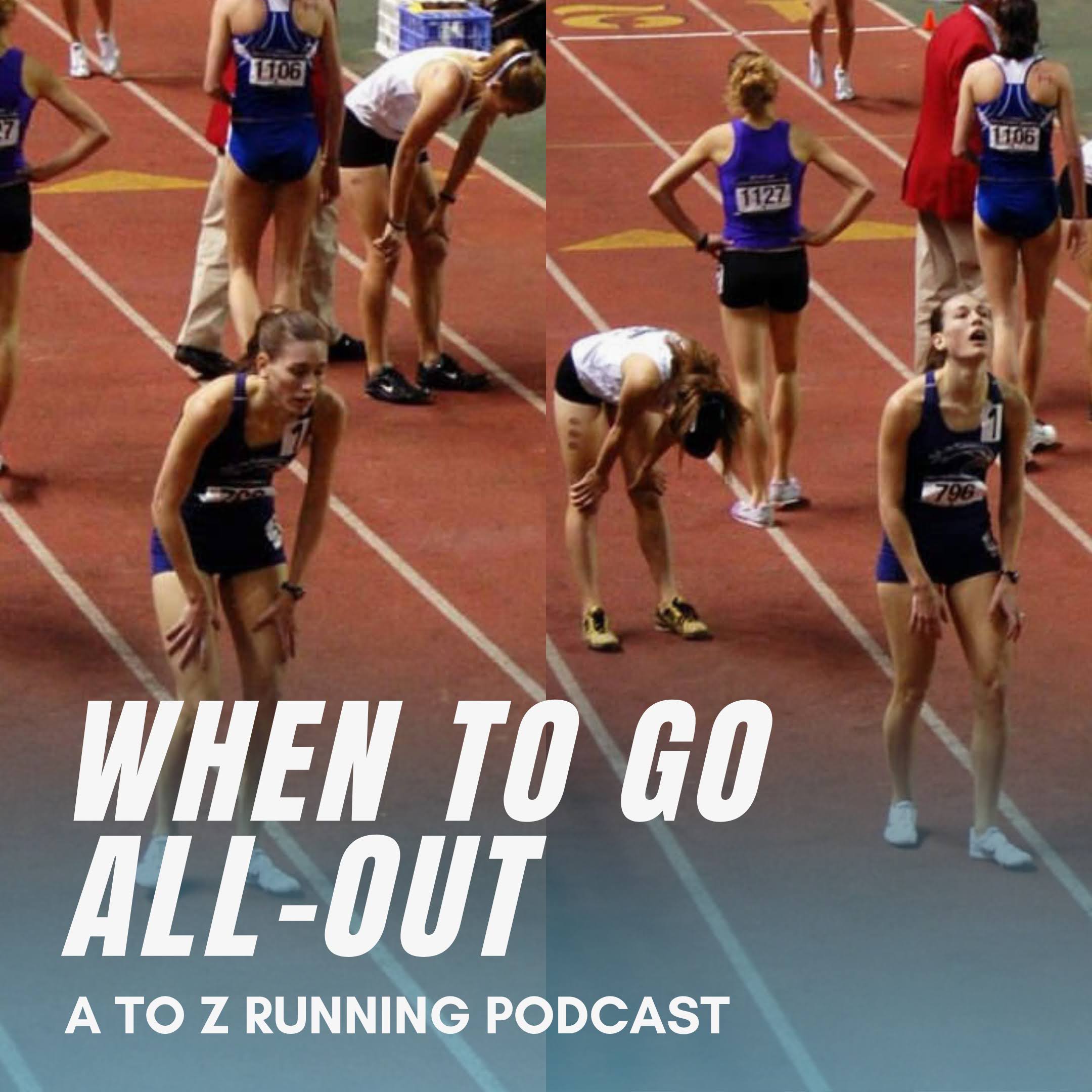LISTEN
When should runners go all-out? In this episode of the A to Z Running Podcast, Zach and Andi talk about draining the well and what that means, how to do it, and when!
INTRO
-
-
- FOLLOW and SUBSCRIBE
- Thanks for joining in on the conversation on social media. Please say hello if you see us at races!
- Ask a question!
- Hip Hook, code: AtoZ
-
MAIN TOPIC: WHEN TO GO ALL-OUT
Main Topic
When to go all out…
Going all out…
-
- Means draining the well
- Relative to what is possible in the moment
- How do you know unless you blow up? (like in a good race… )
- What it doesn’t mean…
Anecdotes
- Andi… went all out or realized after that you had more?
- Chicago 2019
- 1k indoors (both times?)
- Zach… went all out, drained the well beyond all doubt:
- College: national champs steeple
- XC: 10th place finish
- Marathon: Bayshore 2022, Chicago 2015
When you shouldn’t…
- Stress on the body and it’s systems when you go all out (View study here)
- Musculoskeletal system: Muscle tension, and eventually, muscle atrophy due to disuse of the body, all promote chronic, stress-related musculoskeletal conditions.
- Cardiovascular system: The consistent and ongoing increase in heart rate, and the elevated levels of stress hormones and of blood pressure, can take a toll on the body.
- Endocrine system: During a stressful event, an increase in cortisol can provide the energy required to deal with prolonged or extreme challenge. Chronic stress can result in impaired communication between the immune system and the HPA axis.
- Nervous system: (FIGHT OR FLIGHT) As the autonomic nervous system continues to trigger physical reactions, it causes a wear-and-tear on the body. It’s not so much what chronic stress does to the nervous system, but what continuous activation of the nervous system does to other bodily systems that become problematic.
- Difference between training and straining
- In training – EVER
- Andi from college training experiences…
- Most runners think they need to go hard in training or it isn’t “training hard”
- That’s what I thought you were supposed to do
- Competing in training
- Races, then?
- ONLY the important ones/key events
When you should & what it looks like
- Key races
- Costs of doing so
- Delayed training progress/adaptations
- Increased recovery time
- Looks like…
- You want to cross the line knowing that the last step you took before the line was basically it
- How do you do that? One of two ways… either
- (1) Go hard until you’re empty and hold on as long as you can
- (2) drain it gradually until you’re closing, then empty what’s left
But can I run fast when it counts if I don’t drain the well in training?
The short answer is yes.
What you’re really wondering is what it takes to run fast.
WORLD OF RUNNING
World of Running
AtoZrunner updates:
- Andrea ran her first trail 50k
- Zach 5k (2nd), Jacob, Andrew, Stephanie, Erica
#1. European Championships
-
- Women’s 800m
- Keely Hodgkinson finally claimed her gold. Runner up to Athing Mu at the World Championships and runner up to Mary Moraa at the Commonwealth Games, Hodgkinson said she “refused to walk away (today) without gold.”
- She took a different approach to her usual strategy and hung back.
- Women’s 3000m Steeplechase
- Previous guest Alicja Konieczek was 4th in a personal best time of 9:25.15
- Luiza Gega of Albania took the lead early and never relinquished the lead. She won in a championship record of 9:11.31
- 12 year-old championships record by six seconds
- Men’s 1500m & 5,000m
- Jakob Ingebrigsten won uncontested (his second in the event, and since 2012, only one person NOT from the Ingebrigsten family has won Euro 1500m… Henrik in 2012, Filip in 2016, Jakob in 2018 and 2022)
- He also took the 5,000m earlier in the meet over Spain’s Mohamed Katir, successfully defending that title as well
- It should be noted that Ingebrigsten’s first 1500m/5,000m double Euro victory was at the ripe age of 17
- Now, as perhaps the most dominant 1500m/5,000m threat since Hicham El Guerrouj, he’s still only 21 years old
- Women’s 800m
- Women’s 5,000m
- Konstanze Klosterhalfen took the home soil victory in a dominating final 800m
- First Euro gold
- Over Turkey’s Yasemin Can and GB’s Eilish McColgan
- All three also ran the 10,000m, finishing 4th, 1st, 2nd, respectively
#2. NACAC Championships
- The USA dominated the distance events
- North American, Central American and Caribbean Championships
- Ajee Wilson edged out Allie Wilson in the 800m
- US Women swept the 5,000 led by Natosha Rogers in 15:11
- Stephanie Bruce won gold in the 10000m in 33:12, US teammate Emily Lipari in 2nd
- US Women swept the 3000m steeplechase, Gabreille Jennings, Katie Rainsberger, Carmen Graves.
- Sean McGorty and Dillion Maggard go 1, 2 in the men’s 10,000m
- Evan Jager won the men’s steeple, Duncan Hamilton in 2nd
- Eric Holt won and Josh Thompson second in the men’s 1500m
- Heather Maclean won the women’s 1500m
- Jonah Koech won the men’s 800m
- Woody Kincaid won the men’s 5000m
#3. Falmouth Road Race
(Source)
- 7mile race
- Fun fact (source Citius Mag): the event was inspired when by Frank Shorter’s victory in the 1972 Olympic Marathon. Local Tommy Leonard saw that race and wanted to find a way to get Shorter to come there. It only took 3 years (came in 1975)
- Women’s race:
- Strong field, including legend Edna Kiplagat (Kenya), won multiple marathon majors and WC marathons. Arguably in the waning years. Keira D’Amato (USA) fresh off 8th at WC marathon and a US marathon record in the spring
- Came down late-race to a head-to-head between Kiplagat and D’Amato, but D’Amato won the day in 36:14, the first American to win the race in 11 years
- Other names you might recognize included: Makena Morley (7th) and Dakotah Lindwurm (13th)
- Men’s race:
- Defending champ Ben Flanagan (of Canada, also won in 2018) dominated late for a 7-second win of USA’s Biya Simbassa
- Was a strong victory, also beating the likes of USA’s Leonard Korir and Sam Chelenga and Kenya’s David Bett and Wesley Kiptoo
- Others to note include Clayton Young (USA) in 11th
BONUS: WCs Qualifying Even Harder…
World Athletics announced Budapest 2023 standards… and they got even tougher
Clarifying on the process:
- Every field is limited
- Spots go to first: running the standard
- Then some wild card things (past champs, world XC, a few other things)
- Then world ranking to fill the field
Interested in a training plan and/or coaching? We offer personalized support to help you achieve your goals! KEEP LISTENING




Leave a Reply
Want to join the discussion?Feel free to contribute!